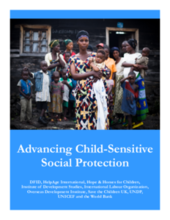Children’s experiences of poverty and vulnerability are multidimensional and differ from those of adults. Children undergo complex physical, psychological and intellectual development as they grow, and are also often more vulnerable to mal-nutrition, disease, abuse and exploitation than adults. Their dependency on adults to support and protect them means that loss of family care is a significant risk, particularly in the context of conflict, humanitarian crises, and HIV and AIDS. Intra-household discrimination can also result in child poverty and hunger, lack of access to ser-vices, and abuse and exploitation.
While many social protection measures – ranging from pensions to unemployment insurance – already benefit children without explicitly targeting them, small nuances in how children are considered in the design, implementation and evaluation of social protection programmes can make a huge difference. Making social protection more child-sensitive has the potential to benefit not only children, but also their families, communities and national development as a whole.
Child-sensitive social protection is an evidence-based approach that aims to maximize opportunities and developmental outcomes for children by considering different dimensions of children's well-being. It focuses on addressing the inherent social disadvantages, risks and vulnerabilities children may be born into, as well as those acquired later in childhood due to external shocks. It is thus best achieved through integrated social protection approaches.
The joint statement aims to build greater consensus on the importance of child-sensitive social protection. It lays out the particular vulnerabilities that children and families face, the ways that social protection can impact children even when not focused on them, and outlines principles and approaches for undertaking child-sensitive social protection. The statement emerged from meetings and discussions between partners to consider and outline the importance of furthering social protection and ensuring it is child-sensitive. Moving forward, we hope the statement will support further dialogue among stake-holders on the evolving policy and programming aspects of child-sensitive social protection. The statement is an open one; for information on joining the signatories and supporting the statement, please visit the website: www.unicef.org/socialpolicy.

